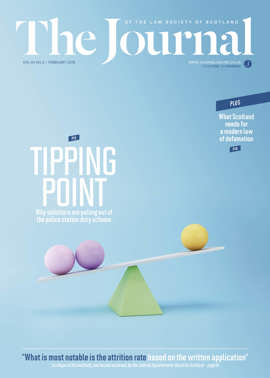Time to call out harassment

As a response to the Weinstein scandal, the global phenomenon that is the #metoo movement has prompted many industries to question their cultures. Change seems necessary, but what change? Surely the idea that people in every industry can speak out about harassment without fear, and be listened to, is an urgent change that needs to be made.
That process of introspection has begun in the Scots legal profession, prompted by the 2017 Journal employment survey which featured a question on sexual harassment. From the responses – and to our Profile of the Profession survey in 2013 – it is clear that some members (particularly though not exclusively female) have been subjected to a spectrum of inappropriate behaviour, from what might euphemistically be called banter through uncomfortable discussions and inappropriate staring to outright sexist remarks. Allegations of more serious sexual harassment – such as physical touching or requesting sexual favours – are less common but do exist.
The Journal survey led to a letters page made up entirely of responses to the sexual harassment question, and a feature article. Readers will have been appalled by the allegations. It is natural to ask: what is the Law Society of Scotland going to do?
Last year, we revised and relaunched our 2011 guidance Preventing bullying and harassment. While it is regrettable that such guidance is needed at all, I do know that those who have used it have found it useful, either to help embed a better working culture or to deal with an issue of bullying and harassment affecting them. I urge anyone who feels they are being bullied, harassed or sexually harassed to consult it.
For those managing practice units or legal teams, I’d recommend looking at that guidance and seeing what they can do to create a workplace where bullying and harassment doesn’t happen; and if it does, ensure it can be dealt with effectively. I’d also suggest signing up to the Society’s Equality & Diversity standards. Compliance with these standards will help to embed a culture of inclusion.
It is important that we strike the right balance. We need to protect any people coming forward as victims or those uncomfortable with what they have witnessed. We also do not want to put ourselves between alleged victims and the proper authorities if allegations are of a criminal nature, nor do we want individuals in the profession potentially defamed via allegations. Due process matters.
Bullying and harassment can be viewed as professional misconduct or unsatisfactory professional conduct. If a member is being sexually harassed in the workplace we encourage them to report such conduct to the Scottish Legal Complaints Commission. The SLCC acts as a gateway to the complaints system and will refer complaints of professional misconduct to us to investigate and act on if appropriate.
What else are we doing? I can say that the Society’s Equality & Diversity Committee discussed sexual harassment in the profession at its meeting last month and has agreed to investigate the issue further in this year’s Profile of the Profession survey. I hope that this provides a stronger evidence base to act in this area.
The letters page of the November Journal should sicken everyone connected to the legal profession. If any member feels that they have been bullied, harassed or sexually harassed then I urge them to seek support from free services like LawCare and our Professional Practice team, and to consider the guidance about avenues of redress, including the SLCC.
What can the wider profession do to stamp this out? It is always easier to turn a blind eye. To say nothing. Tackling the orcs and ogres of the world is the road less travelled. It is easy to write off unacceptable language as “character building” or “a rite of passage”.
I understand the difficulties in calling out behaviour at work. Difficult conversations are not something anyone enjoys. It is doubly difficult when someone is senior to you. There is understandable concern about negative career implications. The obvious rejoinder is that putting up with an organisational culture that allows such behaviour is hardly going to do your career or mental health any good. Not intervening doesn’t mean that nothing happens. It just means something else happens.
What happens when you do call it out? Short-term discomfort is usually followed by long-term morale being boosted. A happier office, a happier team and – no doubt – loyalty through the roof.
This is a plea then, in particular, to senior members of the profession. When you see it, call it out. If you say certain behaviour is unacceptable but then accept it, what does that say about you? Or your organisation? What does the staff member think who hears “unacceptable” but sees it being accepted because the person doing it is powerful or a rainmaker?
More than that, we’ve got to model better behaviour. Show the world that there is a way of succeeding based on collegiality and respect. Let’s be guided by the better angels of our natures, and to quote a former First Lady: when they go low, we go high.
In this issue
- Enforceable rights or progressive policy goals?
- Data processors beware: GDPR holds you responsible too
- Insolvency in a post-Carillion world
- Employee ownership: a strategy that fits
- A mediation Act? The Irish experience
- Journal magazine index 2017
- Reading for pleasure
- Opinion: Andrew Tickell
- Book reviews
- Profile
- President's column
- Digital progress given go ahead
- People on the move
- Tipping point for legal aid?
- Arrest: all change
- Legal software: are you still listening to Gangnam style?
- Defamation law for the digital age
- Choosing our judges: could we do it better?
- A journey through trust compliance
- The Cashroom: 10 years of service
- From dockets to defences
- Sex discrimination runs deep
- Wealth not a bar to s 28 claims
- No spying on the job
- Scottish Solicitors Staff Pension Fund: not the final instalment?
- Scottish Solicitors' Discipline Tribunal
- The Clark Foundation for Legal Education
- LBTT's birthday alert
- Doing all the white stuff
- Solicitor's CBE for life of service
- From the Brussels office
- Paralegal pointers
- Public policy highlights
- The kindest cut
- Wish list for the review
- Benchmarking: take the benefits
- Tax evasion: don't get caught up
- Ask Ash
- Time to call out harassment
- Q & A corner






